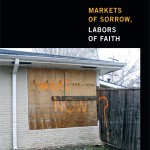 Markets of Sorrow, Labors of Faith: New Orleans in the Wake of Katrina. Vincanne Adams (Durham, NC: Duke University Press, 2013)
Markets of Sorrow, Labors of Faith: New Orleans in the Wake of Katrina. Vincanne Adams (Durham, NC: Duke University Press, 2013)
Markets of Sorrow, Labors of Faith is an ethnographic account of long-term recovery in post-Katrina New Orleans. It is also a sobering exploration of the privatization of vital social services under market-driven governance. In the wake of Hurricane Katrina, public agencies subcontracted disaster relief to private companies that turned the humanitarian work of recovery into lucrative business. These enterprises profited from the very suffering that they failed to ameliorate, producing a second-order disaster that exacerbated inequalities based on race and class and leaving residents to rebuild almost entirely on their own.
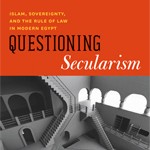 Questioning Secularism: Islam, Sovereignty, and the Rule of Law in Modern Egypt. Hussein Ali Agrama. Chicago and London: University of Chicago Press, 2012.
Questioning Secularism: Islam, Sovereignty, and the Rule of Law in Modern Egypt. Hussein Ali Agrama. Chicago and London: University of Chicago Press, 2012.
The central question of the Arab Spring—what democracies should look like in the deeply religious countries of the Middle East—has developed into a vigorous debate over these nations’ secular identities. But what, exactly, is secularism? What has the West’s long familiarity with it inevitably obscured? In Questioning Secularism, Hussein Ali Agrama tackles these questions. Focusing on the fatwa councils and family law courts of Egypt just prior to the revolution, he delves deeply into the meaning of secularism itself and the ambiguities that lie at its heart.
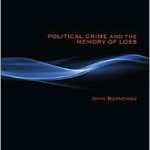 Political Crime and the Memory of Loss. John Borneman (Bloomington: Indiana University Press 2012).
Political Crime and the Memory of Loss. John Borneman (Bloomington: Indiana University Press 2012).
Loss is a fundamental human condition that often leads both individuals and groups to seek redress in the form of violence. But are there possible modes of redress to reckon with loss that might lead to a departure from the violence of collective and individual revenge? This book focuses on the redress of political crime in Germany and Lebanon, extending its analysis to questions of accountability and democratization in the United States and elsewhere. To understand the proposed modes of redress, John Borneman links the way the actors define their injuries to the cultural forms of redress these injuries assume and to the social contexts in which they are open to refiguring. Borneman theorizes modes of accountability, the meaning of “regime change” and the American occupation of Iraq, and the mechanisms of democratic authority in Europe and North America.
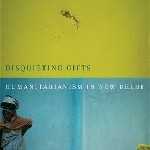 Disquieting Gifts: Humanitarianism in New Delhi. Erica Bornstein (Stanford: Stanford University Press, 2012).
Disquieting Gifts: Humanitarianism in New Delhi. Erica Bornstein (Stanford: Stanford University Press, 2012).
While most people would not consider sponsoring an orphan’s education to be in the same category as international humanitarian aid, both acts are linked by the desire to give. Many studies focus on the outcomes of humanitarian work, but the impulses that inspire people to engage in the first place receive less attention. Disquieting Gifts takes a close look at people working on humanitarian projects in New Delhi to explore why they engage in philanthropic work, what humanitarianism looks like to them, and the ethical and political tangles they encounter. Motivated by debates surrounding Marcel Mauss’s The Gift, Bornstein investigates specific cases of people engaged in humanitarian work to reveal different perceptions of assistance to strangers versus assistance to kin, how the impulse to give to others in distress is tempered by its regulation, suspicions about recipient suitability, and why the figure of the orphan is so valuable in humanitarian discourse. The book also focuses on vital humanitarian efforts that often go undocumented and ignored and explores the role of empathy in humanitarian work.
 Can Islam Be French? Pluralism and Pragmatism in a Secularist State. John R. Bowen (Princeton, Princeton University Press, 2010).
Can Islam Be French? Pluralism and Pragmatism in a Secularist State. John R. Bowen (Princeton, Princeton University Press, 2010).
Can Islam Be French? is an anthropological examination of how Muslims are responding to the conditions of life in France. Following up on his book Why the French Don’t Like Headscarves, John Bowen turns his attention away from the perspectives of French non-Muslims to focus on those of the country’s Muslims themselves. Bowen asks not the usual question–how well are Muslims integrating in France?–but, rather, how do French Muslims think about Islam? In particular, Bowen examines how French Muslims are fashioning new Islamic institutions and developing new ways of reasoning and teaching. He looks at some of the quite distinct ways in which mosques have connected with broader social and political forces, how Islamic educational entrepreneurs have fashioned niches for new forms of schooling, and how major Islamic public actors have set out a specifically French approach to religious norms. All of these efforts have provoked sharp responses in France and from overseas centers of Islamic scholarship, so Bowen also looks closely at debates over how–and how far–Muslims should adapt their religious traditions to these new social conditions. He argues that the particular ways in which Muslims have settled in France, and in which France governs religions, have created incentives for Muslims to develop new, pragmatic ways of thinking about religious issues in French society.
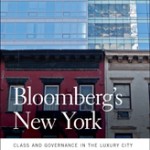 Bloomberg’s New York: Class and Governance in the Luxury City. Julian Brash (Athens, G.A.: The University of Georgia Press, 2011).
Bloomberg’s New York: Class and Governance in the Luxury City. Julian Brash (Athens, G.A.: The University of Georgia Press, 2011).
New York mayor Michael Bloomberg claims to run the city like a business. In Bloomberg’s New York, Julian Brash applies methods from anthropology, geography, and other social science disciplines to examine what that means. He describes the mayor’s attitude toward governance as the Bloomberg Way—a philosophy that holds up the mayor as CEO, government as a private corporation, desirable residents and businesses as customers and clients, and the city itself as a product to be branded and marketed as a luxury good. Commonly represented as pragmatic and nonideological, the Bloomberg Way, Brash argues, is in fact an ambitious reformulation of neoliberal governance that advances specific class interests. He considers the implications of this in a blow-by-blow account of the debate over the Hudson Yards plan, which aimed to transform Manhattan’s far west side into the city’s next great high-end district. Bringing this plan to fruition proved surprisingly difficult as activists and entrenched interests pushed back against the Bloomberg administration, suggesting that despite Bloomberg’s success in redrawing the rules of urban governance, older political arrangements—and opportunities for social justice—remain.
 Zooland: The Institution of Captivity. Irus Braverman (Stanford: Stanford University Press, 2012).
Zooland: The Institution of Captivity. Irus Braverman (Stanford: Stanford University Press, 2012).
This book takes a unique stance on a controversial topic: zoos. Zoos have their ardent supporters and their vocal detractors. And while we all have opinions on what zoos do, few people consider how they do it. Irus Braverman draws on more than seventy interviews conducted with zoo managers and administrators, as well as animal activists, to offer a glimpse into the otherwise unknown complexities of zooland.
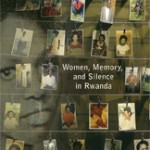 Genocide Lives in Us: Women, Memory, and Silence in Rwanda. Jennie E. Burnet (Madison: University of Wisconsin Press, 2012).
Genocide Lives in Us: Women, Memory, and Silence in Rwanda. Jennie E. Burnet (Madison: University of Wisconsin Press, 2012).
In the aftermath of the 1994 genocide, Rwandan women faced the impossible— resurrecting their lives amidst unthinkable devastation. Haunted by memories of lost loved ones and of their own experiences of violence, women slowly rebuilt their lives and traversed dangerous emotional and political terrain to emerge as leaders in Rwanda today. This clear and engaging ethnography of survival tackles three interrelated phenomena—memory, silence, and justice—and probes the contradictory roles women played in postgenocide reconciliation.
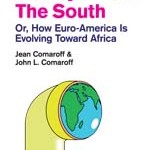 Theory from the South or, How Euro-America Is Evolving toward Africa. Comaroff, Jean, and John L. Comaroff. (Boulder, CO: Paradigm Publishers, 2012).
Theory from the South or, How Euro-America Is Evolving toward Africa. Comaroff, Jean, and John L. Comaroff. (Boulder, CO: Paradigm Publishers, 2012).
The “Global South” has become shorthand for the world of non-European, postcolonial peoples. Synonymous with uncertain development, unorthodox economies, failed states, and nations fraught with corruption, poverty, incivility, and strife, it is that half of the world about which the “Global North” spins theories. Rarely the “Global South” is seen as a source of theory and explanation for world historical events. Yet, as many nation-states of the Northern Hemisphere experience increasing fiscal meltdown, state privatization, corruption, ethnic conflict, and other crises, it seems as though they are evolving southward, so to speak, in both positive and problematic ways. Is this so? How? In what measure? Anthropologists Jean and John Comaroff take on these questions, reversing the usual order of things. Drawing on their long experience of living in Africa and teaching in Europe and the U.S., they address a range of familiar themes—democracy, law, national borders, labor and capital, religion and the occult, liberalism and multiculturalism—with the imagination and agile prose for which they are well known. They ask how we might understand these things anew with theory developed in the South. Their ethnographic eye stresses the salience of the local without losing sight of the large-scale processes in everyday lives that are everywhere enmeshed. This view from the South renders key problems of our time at once strange and familiar, giving an ironic twist to the evolutionary pathways long assumed by social scientists.
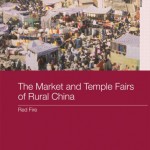 The Market and Temple Fairs of Rural China: Red Fire. Gene Cooper (London: Routledge, 2013).
The Market and Temple Fairs of Rural China: Red Fire. Gene Cooper (London: Routledge, 2013).
During the early communist period of the 1950s, temple fairs in China were both suppressed and secularized. Temples were closed down by the secular regime and their activities classified as feudal superstition and this process only intensified during the Cultural Revolution when even the surviving secular fairs, devoted exclusively to trade with no religious content of any kind, were suppressed. However, once China embarked on its path of free market reform and openness, secular commodity exchange fairs were again authorized, and sometimes encouraged in the name of political economy as a means of stimulating rural commodity circulation and commerce. This book reveals how once these secular “temple-less temple fairs” were in place, they came to serve not only as venues for the proliferation of a great variety of popular cultural performance genres, but also as sites where a revival or recycling of popular religious symbols, already underway in many parts of China, found familiar and fertile ground in which to spread
 Unsettling Gaza: Secular Liberalism, Radical Religion, and the Israeli Settlement Project. Joyce Dalsheim (Oxford: Oxford University Press, 2011)
Unsettling Gaza: Secular Liberalism, Radical Religion, and the Israeli Settlement Project. Joyce Dalsheim (Oxford: Oxford University Press, 2011)
This ethnographic study takes a unique approach to one of the most contentious issues in the Middle East—the Israeli settlement project. The book’s work intercedes in the conflict between religiously motivated Jewish settlers and their liberal and secular opponents and asks the reader to suspend judgment just long enough to gain fresh insight. The book shows that the intense antagonism between these groups disguises their fundamental similarities and reveals the social and cultural work achieved through a politics of mutual denunciation. While previous studies have examined settlers and other so-called fundamentalists in Israel, this is the first to place radical, right-wing settlers and their left-wing and secular opposition in a single analytical frame, moving between places and across borders, carrying stories, questions, and insights from one side to the other
 Human Rights and African Airwaves: Mediating Equality on the Chichewa Radio. Harri Englund (Bloomington, IN: Indiana University, 2011).
Human Rights and African Airwaves: Mediating Equality on the Chichewa Radio. Harri Englund (Bloomington, IN: Indiana University, 2011).
Human Rights and African Airwaves focuses on Nkhani Zam’maboma, a popular Chichewa news bulletin broadcast on Malawi’s public radio. The program often takes authorities to task and questions much of the human rights rhetoric that comes from international organizations. Highlighting obligation and mutual dependence, the program expresses, in popular idioms and local narrative forms, grievances and injustices that are closest to Malawi’s impoverished public. Harri Englund reveals broadcasters’ everyday struggles with state-sponsored biases and a listening public with strong views and a critical ear. This fresh look at African-language media shows how Africans effectively confront inequality, exploitation, and poverty.
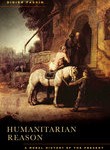 Humanitarian Reason: A Moral History of the Present. Didier Fassin (Berkeley: University of California Press, 2012).
Humanitarian Reason: A Moral History of the Present. Didier Fassin (Berkeley: University of California Press, 2012).
In the face of the world’s disorders, moral concerns have provided a powerful ground for developing international as well as local policies. Didier Fassin draws on case materials from France, South Africa, Venezuela, and Palestine to explore the meaning of humanitarianism in the contexts of immigration and asylum, disease and poverty, disaster and war. He traces and analyzes recent shifts in moral and political discourse and practices — what he terms “humanitarian reason”— and shows in vivid examples how humanitarianism is confronted by inequality and violence. Deftly illuminating the tensions and contradictions in humanitarian government, he reveals the ambiguities confronting states and organizations as they struggle to deal with the intolerable. His critique of humanitarian reason, respectful of the participants involved but lucid about the stakes they disregard, offers theoretical and empirical foundations for a political and moral anthropology.
 Building Fortress Europe: The Polish-Ukrainian Frontier. Karolina S. Follis (Philadelphia: University of Pennsylvania Press, 2012).
Building Fortress Europe: The Polish-Ukrainian Frontier. Karolina S. Follis (Philadelphia: University of Pennsylvania Press, 2012).
What happens when a region accustomed to violent shifts in borders is subjected to a new, peaceful partitioning? Has the European Union spent the last decade creating a new Iron Curtain at its fringes?Building Fortress Europe: The Polish-Ukrainian Frontier examines these questions from the perspective of the EU’s new eastern external boundary. Since the Schengen Agreement in 1985, European states have worked together to create a territory free of internal borders and with heavily policed external boundaries. In 2004 those boundaries shifted east as the EU expanded to include eight postsocialist countries—including Poland but excluding neighboring Ukraine. Through an analysis of their shared frontier, Building Fortress Europe provides an ethnographic examination of the human, social, and political consequences of developing a specialized, targeted, and legally advanced border regime in the enlarged EU.
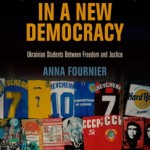 Forging Rights in a New Democracy: Ukrainian Students Between Freedom and Justice. Anna Fournier: University of Pennsylvania Press, 2012.
Forging Rights in a New Democracy: Ukrainian Students Between Freedom and Justice. Anna Fournier: University of Pennsylvania Press, 2012.
The last two decades have been marked by momentous changes in forms of governance throughout the post-Soviet region. Ukraine’s political system, like those of other formerly socialist states of Eastern Europe, has often been characterized as being “in transition,” moving from a Soviet system to one more closely aligned with Western models. Anna Fournier challenges this view, investigating what is increasingly recognized as a critical aspect of contemporary global rights discourse: the active involvement of young people living in societies undergoing radical change. Fournier delineates a generation simultaneously embracing various ideological stances in an attempt to make sense of social conditions marked by the disjuncture between democratic ideals and the everyday realities of growing economic inequality.
 Pogrom in Gujarat: Hindu Nationalism and Anti-Muslim Violence in India. Parvis Ghassem-Fachandi (Princeton: Princeton University Press, 2012).
Pogrom in Gujarat: Hindu Nationalism and Anti-Muslim Violence in India. Parvis Ghassem-Fachandi (Princeton: Princeton University Press, 2012).
In 2002, after an altercation between Muslim vendors and Hindu travelers at a railway station in the Indian state of Gujarat, fifty-nine Hindu pilgrims were burned to death. The ruling nationalist Bharatiya Janata Party blamed Gujarat’s entire Muslim minority for the tragedy and incited fellow Hindus to exact revenge. The resulting violence left more than one thousand people dead–most of them Muslims–and tens of thousands more displaced from their homes. Parvis Ghassem-Fachandi witnessed the bloodshed up close. In Pogrom in Gujarat, he provides a riveting ethnographic account of collective violence in which the doctrine of ahimsa–or nonviolence–and the closely associated practices of vegetarianism became implicated by legitimating what they formally disavow. Ghassem-Fachandi looks at how newspapers, movies, and other media helped to fuel the pogrom. He shows how the vegetarian sensibilities of Hindus and the language of sacrifice were manipulated to provoke disgust against Muslims and mobilize the aspiring middle classes across caste and class differences in the name of Hindu nationalism. Drawing on his intimate knowledge of Gujarat’s culture and politics and the close ties he shared with some of the pogrom’s sympathizers, Ghassem-Fachandi offers a strikingly original interpretation of the different ways in which Hindu proponents of ahimsa became complicit in the very violence they claimed to renounce.
 Enclosed: Conservation, Cattle, and Commerce among the Q’eqchi’ Maya Lowlanders. Liza Grandia (Seattle: University of Washington Press, 2012).
Enclosed: Conservation, Cattle, and Commerce among the Q’eqchi’ Maya Lowlanders. Liza Grandia (Seattle: University of Washington Press, 2012).
This impassioned and rigorous analysis of the territorial plight of the Q’eqchi Maya, Guatemala’s second largest indigenous group, highlights an urgent problem for indigenous communities around the world – repeated displacement from their lands. Having lost most of their highland territory to foreign coffee planters at the end of the 19th century, Q’eqchi’ people began migrating into the lowland forests of northern Guatemala and southern Belize. Then, pushed deeper into the frontier by cattle ranchers, lowland Q’eqchi’ found themselves in conflict with biodiversity conservationists who established protected areas across this region during the 1990s.



